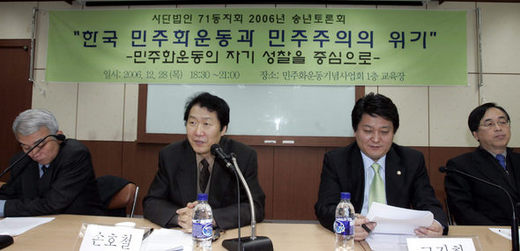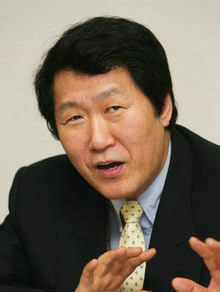Posted on : Dec.29,2006 12:46 KST
Modified on : Dec.31,2006 14:10 KST
Incompetence, moral missteps need to be examined, says political observer
Once part of South Korea’s democracy movement, former activists are increasingly being asked to reflect on recent missteps.
On December 28, a debate was held by the 71 Comrade Association, consisting of those who were student activists in 1971 against the Park Chung-hee dictatorship. The association’s members include Kim Geun-tae, leader of the ruling Uri Party, Kim Moon-soo, governor of Gyeonggi province, and ruling party lawmakers such as Won Hye-young and Yoo Ihn-tae.
At the debate, Sogang University professor Sohn Ho-chul said South Korea’s democracy is facing "the biggest crisis" since its push for democracy just before elections were restored in 1987. Professor Sohn cited incompetence and moral missteps among the former activists, many of whom now work for the government or nongovernmental agencies.
Sohn accused the Roh Moo-hyun administration of accelerating the former activists’ being perceived as incompetent. "The Roh Moo-hyun administration had pledged to cool housing prices, but the result was always a surge in home prices," the professor said. "The situation led people to hate the democratic activists as a whole."
 |
|
Professor Sohn sits second from left at a debate, held by the 71 Comrade Association.
|
In addition, Professor Sohn picked the matter of the notorious National Security Law as an example of incompetence for the democratic activists. In 2004, the Roh Moo-hyun administration ambitiously pushed to abolish the decades-old anti-communist law, but the drive saw no results, even though the Uri Party held a majority of seats in the National Assembly at the time.
"President Roh is conservative without content, radical in style and militant in remarks, creating a politics of hate and a chaos among people," Professor Sohn said.
The professor also said that neoliberalism was a structural cause in the current crisis. By pushing for neoliberalist policies, the Kim Dae-jung and Roh Moo-hyun administrations in succession created "the worst-ever economic polarization," Professor Sohn said.
"As a result, low-income people, expected to stand alongside forces of democracy and reform, instead now oppose democratic reform and miss Park Chung-hee," he said.
Immoral behavior in the former democratic activist camp is another reason for the current political crisis, the professor said, citing an array of arrests of head officials at labor groups on charges of bribery. "A high level of morality, which was the most touted virtue of the democratic activist camp, has collapsed across the camp and throughout the political arena," he said.
He also criticized the fact that some former activists that were at the brutal crackdown on democracy protesters in Gwangju in 1980 now occupy high positions in government yet still ask for monetary compensation for their role in the incident. He compared the situation to that in Argentina, where the Mothers of Plaza de Mayo have refused compensation, choosing instead to keep the spirit of their movement alive through continued demonstrations.
"The strongest weapon for the democratic forces was morality, not money and gasoline bombs," Sohn stressed. "All of the democratic forces should go back to basics and practice some self-reflection." Without this self-reflection, he said "the democratic forces will not be able to defend the nation from the threat of force stemming from a still existent Cold-War era spirit, which has already started regaining political momentum."
Please direct questions or comments to [englishhani@hani.co.kr]







